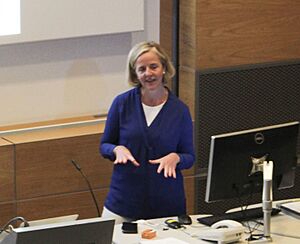Rachel McKendry facts for kids
Quick facts for kids
Rachel McKendry
|
|
|---|---|

Rachel McKendry in September 2016
|
|
| Born |
Rachel Anne McKendry
|
| Alma mater | Durham University (BSc) University of Cambridge (PhD) |
| Awards | Royal Society Wolfson Research Merit Award (2014) Rosalind Franklin Award (2014) |
| Scientific career | |
| Institutions | University College London |
| Thesis | Chemical force microscopy (1999) |
| Academic advisors | Trevor Rayment and Chris Abell |
Rachel Anne McKendry is a British chemist. She is a leading scientist who works on creating smart systems to detect infectious diseases early. She is the Director of i-sense, a research group in the UK. She also helps fight against diseases that are hard to treat with medicines.
Professor McKendry teaches at University College London (UCL). She is a Professor of Biomedical Nanoscience. This means she studies tiny things (nano) that are important for health (bio). She works in both the Division of Medicine and the London Centre for Nanotechnology.
Contents
Early Life and Education
Rachel McKendry studied chemistry at Durham University. She finished her first degree in 1994. Later, she earned her PhD from the University of Cambridge in 1999. A PhD is a very high university degree. In 1998, she also won a special research award from Girton College, Cambridge.
Career and Research
After her PhD, Dr. McKendry worked as a researcher at the IBM Zurich Research Laboratory. This is a place where scientists do advanced studies. She then came back to the UK. She received a special research award called the Royal Society Dorothy Hodgkin Research Fellowship. This allowed her to work at University College London.
Fighting Diseases with Technology
Professor McKendry leads a team of scientists. They combine different fields like tiny technology (nanotechnology) and communication (telecommunications). They also use big data, which is a lot of information. Their goal is to find new ways to detect infectious diseases and improve public health.
In 2015, she gave a talk about "The Digital Future of Public Health." She talked about creating early warning systems for disease outbreaks. These systems are like Google Flu Trends. They use information from social media and smartphones. This helps scientists track diseases like SARS and Ebola.
She has written many important research papers. These papers have been published in top science journals. Some of these include Nature and Nature Nanotechnology.
New Discoveries in Disease Detection
Her recent research has led to exciting discoveries. She uses tiny diamond materials to find viruses. These are called nanodiamond quantum materials. They can detect viruses with great sensitivity. She also uses tiny sensors called cantilever nanosensors. These help find out if bacteria are resistant to medicines.
Her team also uses deep learning. This is a type of artificial intelligence. It helps improve rapid tests done outside of a lab. Professor McKendry also led a study on how digital tools helped fight COVID-19.
i-sense Research Project
Professor McKendry is the Director of i-sense. This is a big research project that started in 2013. Its main goal is to create early warning systems for infectious diseases. The project gets funding from the Engineering and Physical Sciences Research Council. It has received a lot of money to support its important work.
Helping Government and Health Services
Professor McKendry has been part of important groups. These groups help make decisions about health and science.
- She was on the Steering Group for the Infectious Diseases Research Network. This group worked to reduce the impact of diseases on the NHS. They focused on diseases like tuberculosis and infections caught in hospitals.
- She was part of the UK Government's Blackett Review panel. This group looked at ways to detect biological threats. Their report in 2014 suggested technologies to respond to disease outbreaks.
- She used to be an expert advisor to the UK Prime Minister's Council for Science and Technology.
- She helped lead a review called the Topol Review of the NHS. This review looked at how to prepare healthcare workers for a digital future.
Awards and Honours
Professor McKendry has received several important awards for her work.
In 2009, she won the Institute of Physics Clifford Paterson Medal and Prize.
In 2014, she received a Royal Society Wolfson Research Merit Award. This award helped her study new ways to connect global health efforts for infectious diseases.
Also in 2014, she received the Royal Society Rosalind Franklin Award. This award recognized her scientific achievements. It also honored her role as an inspiration for others. She proposed a competition to create mobile phone apps. These apps would encourage women to become leaders in science, technology, engineering, and mathematics (STEM).
 | Roy Wilkins |
 | John Lewis |
 | Linda Carol Brown |

